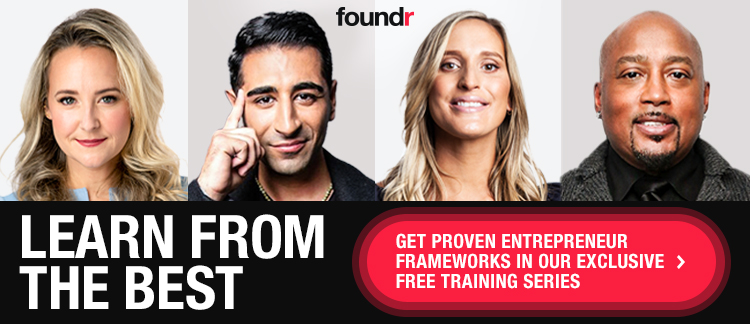Want to become a world-class rock climber? Watch Alex Honnold. Looking to become the next President of the United States? Study about Barack Obama. Want to become a successful entrepreneur? Learn from Arianna Huffington and Gary Vaynerchuk.
While you can kick back, relax, and watch YouTube videos and Netflix documentaries about these masters of their trade, you’ve probably had enough screen time while building your business. Instead, whip up a mug of hot cocoa, cozy up next to your space heater and furry friend, and pick up a business startup book.
Sure, an eBook or audiobook will do the trick, too—but there’s something special about paper, ink, and the wisdom in between.
With all the millions of books out there, where should you start? Good question. We set out to find and read the best business startup books, and while it’s hard to narrow it down, we’re pretty happy with the list we curated.
You don’t need these books on your bookshelf. Nor do you need them at your desk. You need them in your hands. You need their words in your mind.
All that to say, buying the best business startup books won’t do you very much good unless you set aside time, read, and apply the principles.
Below, we’ve compiled a list of 10 business startup books that’ll change the way you start and scale your startup. You’ll learn everything from day-to-day management techniques and virality boosting tips to mindset changes and finding your life’s purpose.
Don’t Read Any of These Startup Books—Study Them
Reading is great, but studying is better.
Think about all the things you’ve read today: emails, articles, tweets, texts, guides, and cereal boxes. Do you remember much of the content? Probably not.
That’s because we spend hours every day reading. Today’s generations scan content faster than ever before, but with so much data coming in, it’s harder for our brains to pick and choose what to retain.
That’s where studying comes in.
Studying involves attention, note-taking, commitment, and action. It’s not something you can do at the end of a long day while lying in bed.
If you’re going to take the time to read these business books, get as much out of them as you possibly can. Create a quiet, distraction-free environment for you to study. After reading a chapter, take notes and highlight the takeaways. Write down (don’t just mentally note) what you plan to do with this newfound knowledge.
12 Best Business Startup Books
With all the bajillion books out there, why did we settle on 10? Well, you’ve got a business to build. Reading and studying will help, but they’re only supplements to getting your hands dirty and getting to work.
Study, apply, build, repeat. Oh, and don’t forget to have fun, too.
Books are great. We love books. You should read every single one of the books we’ve outlined below—but pace yourself. That means you probably shouldn’t spend every spare moment with your nose stuck in a business book.
Take an evening to binge a Netflix show every now and then. Spend an evening with friends. Go for a walk.
Your business isn’t going anywhere.
You’ve got this, entrepreneur.
1. Born to Shine
Kendra Scott started her self-titled billion-dollar jewelry business out of failure. Her first business failed after 5 years, and she started selling handmade jewelry door-to-door as a side hustle.
Now, Kendra Scott Jewelry is a billion-dollar business with 100 retail locations across the US. But success didn’t come quickly. Through personal struggles, recessions, and rejections, Scott built a fashion business driven by an unforgettable customer experience.
In her entrepreneurial memoir Born to Shine, she shares leadership lessons from her successes and failures.
“Giving those tools of an entrepreneur mindset can be so beneficial,” Scott says. “I think this is a book not just for business owners or entrepreneurs but for people that are going through a transition in their life.”
Scott says that flaws and failures are what make us unique. As an entrepreneur, business leader, and person, embracing the pain gives you power. The “nos” lead to the next “yes.”
“It doesn’t matter what you’ve gone through,” Scott says. “You were put on this earth to do something awesome, whatever that is that brings you joy.”
2. Made to Stick
Made to Stick explores the art of building unforgettable ideas. Brothers Heath, Chip, and Dan explain why you remember Kennedy’s stirring speech about making it to the moon and why everyone from your grandfather to your 3-year-old niece link “Just Do It” and Nike together.
Chip and Dan outline the 6 characteristics necessary to make a message “sticky.” Don’t worry—this isn’t a spoiler:
- Simple
- Unexpected
- Credible
- Concrete
- Emotional
- Story
Storytelling is at the heart of every business, from Apple to IKEA to Patagonia. Unfortunately, some stories die young, but it’s not because the tale or mission is uncompelling—it’s because entrepreneurs didn’t know how to tell it.
Made to Stick transforms the way you communicate. Apply the principles in this book, and everything from your “About Us” page to your Slack conversations will benefit.
3. Thinking, Fast and Slow
Author Daniel Kahneman’s Thinking, Fast and Slow is an entertaining exploration of the way humans think. Understanding the concepts in this book and the psychology of the human brain not only helps you understand your humanity, but they help you learn more about your prospective customers.
Kahneman breaks down all this knowledge and logic into a compelling narrative. Trust us—you won’t feel like you’re reading a business startup book when you read this cover to cover.
If all your copywriting tactics and marketing strategies have failed, this book will tell you why (and what to do about it).
4. Winners Never Cheat
Good guys really can (and should) finish first—and Jon Huntsman proves it in Winners Never Cheat: Even in Difficult Times. Inevitably, you’re going to face business opportunities to lie, steal, cut corners, or cheat your way to success.
You might even be able to get away with it without ever being caught.
Yet, Jon Huntsman advocates for a higher way of living and doing business. Your life as a founder and entrepreneurial leader can be full of courage and integrity—and it should be.
Learn how to make the right ethical decisions, even when it’s hard. Remember why you work and what you’re pushing to achieve. Acquire the tools you need to always do what’s right regardless of the consequences.
If more people read Winners Never Cheat, the world would be a much better place. The insanely rich wouldn’t be the only winners—all their employees, shareholders, customers, and communities would be, too.
5. The 4-Hour Workweek
While the title might feel clickbaity, the content inside isn’t. The 4-Hour Workweek outlines techniques for how you can work less, make more, and build the life you want instead of living the life you’ve been handed.
Some entrepreneurs want to start their own businesses to get rich. Others do it to gain more everyday freedom. And some people just want to do whatever it takes to live a fulfilling life.
Tim Ferriss shares all the hacks and tools you need to do more with less. This guide shows you:
- How to automate your business to work even when you’re gone.
- How to affordably outsource the minutiae of your business to free up valuable time.
- Methods to eliminate busy work and focus on what really matters.
- How to take “mini-retirements” now instead of waiting until the end of your life to take a break.
- Real-world templates for negotiating, cutting meetings out of your life, and building the work-life balance you’ve always wanted.
Today’s modern work world embraces and celebrates go-getters who trade sleep and social lives for work. “Hustle, hustle, hustle,” they cheer. Ferriss disagrees.
Ferriss gives drowning and aspiring entrepreneurs a reality check by showing you don’t need to work 80 hour weeks to be successful. In fact, you’re probably getting in the way of your business. Take a step by and accomplish more by doing less.
6. Think Like a Monk
Not quite what you expected to find on a shelf of business startup books, is it? Yet, Think Like a Monk is a timeless book that’ll help just about anyone find purpose, peace, and happiness in what they do.
Recognize those millionaires who look absolutely miserable? Money isn’t everything. Neither is a successful business.
Think Like a Monk outlines the principles to live by to ensure you don’t end up like those unsuccessful success stories.
Former monk (though, once a monk, always a monk) Jay Shetty had it all: education, financial support, and a line of businesses wanting to hire him. But when his college graduation ceremony came around, Shetty wasn’t there—he was headed to India to leave his old life behind in exchange for a life full of purpose and meaning.
Think Like a Monk isn’t a sly attempt to convert the masses to Buddhism or life in an ashram. Shetty distills the wisdom he learned as a monk to help you live a less anxious, more rewarding life doing what you love.
You’ll learn:
- How to find your purpose
- How to learn from everyone you meet
- Why you haven’t been able to find happiness (yet)
- How to overcome negativity
- How to stop overthinking
7. Lean In
Men, before you bounce because you see “women” in the title, stick around—this one is as much for you as it is for them (and maybe even more so).
Lean In: Women, Work, and the Will to Lead shows why women deserve to be at the top of the corporate ladder—and, more importantly, how to get there.
The world needs (desperately needs) women at the top. However, it also needs the superhuman nurturing characteristics mothers contribute to their families.
Author Sheryl Sandberg doesn’t argue for women to abandon their children and chase careers—she advocates and lays out the blueprint for how mothers can find work-life balance while still pursuing their passions.
It’s 2021, and gender bias is still alive. While we’re all more aware of it, it’s still something we’re striving to overcome.
Whether you’re a woman pushing to advance your career or a man with a family, this is a timely book for all cultures and genders.
8. Thrive
Our current definition of success is killing us. We want money and power, and we’re willing to sacrifice our health, family relationships, sleep, and well-being to get it—often, without realizing it.
It’s hard to argue that Arianna Huffington hasn’t tasted this version of success. As co-founder of the Huffington Post Media Group, she’s recognized as one of the world’s most influential women—but is money, influence, fame, and never-ending burnout and exhaustion what success is supposed to look like?
Huffington doesn’t think so. She argues that we need a third metric to define success: thrive. Thrive includes our wellbeing, sense of wonder, and compassion.
Think about where you spend your time, and think about what you want to be remembered for. Do you want to be remembered for powerful PowerPoint presentations, sleepless nights at your desk, and arbitrary promotion titles? Or would you like your eulogy to celebrate your shared memories, fun adventures, small acts of service, and unapologetic lifelong passions?
Before you embark too far on your entrepreneurial journey, take a step back with Thrive to determine your vision of success. When hard decisions come (which they will) and burnout threatens your life and health (and it will), reflect on what you ultimately want. Are you on the path to money and power? If so, do you have the third leg of your stool, thrive, to keep you from toppling over?
9. Radical Candor
Author Kim Scott earned her stripes while working at Apple, Google, and various other startups. Like most of us, she grew up hearing the phrase “if you don’t have anything nice to say, don’t say anything at all.” However, she watched first-hand how not saying anything at all ruined lives and destroyed careers.
For example, Scott shares how a manager didn’t want to offend an under-performing employee with critical feedback during their review cycle. When job cuts came around, that employee lost their job—and it wasn’t their fault alone. The manager could have done something to change the trajectory of that employee’s career if they would have had a bit of candor.
Candor isn’t about being an unapologetic jerk. It’s about caring enough to say the hard things. The world doesn’t need more trolls. It needs more leaders with candor.
Become less like cringe-inducing Michael Scott and more like kick-ass Kim Scott with the lessons taught in Radical Candor.
10. The Lean Startup
You didn’t think we’d create a list of business startup books and leave out The Lean Startup, did you?
Let’s face it: most startups fail. Yet, yours doesn’t have to.
The Lean Startup teaches you how to leverage human creativity and capital more effectively to build a company made to last. You’ll learn:
- How to rapidly test and validate ideas
- How to adapt and adjust before it’s too late
- Methods for measuring progress instead of vanity metrics
- What your customers actually want
- How to keep your startup nimble and agile
Test your ideas before you invest your 401(k) into them. Ignore what your customers say—instead, watch what they do. Build a minimum viable product (MVP) first before you waste time and money.
These are the valuable, unpopular lessons you’ll learn in The Lean Startup. Author Eric Ries doesn’t want your success to be a bet, chance, or a 1 in 7 billion success story like Mark Zuckerberg. He wants your success to be formulated and data-driven.
Ditch the fantasies and embrace the scientific approach. It’s not the sexiest method for building a startup, but it’s one that flips the odds of success into your favor.
11. Hangry
If you don’t know Mike Evans, you’ve probably used his first business when the craving for takeout hits you on a Saturday night. Evans started GrubHub in 2002 as a hobby and built it into one of the largest food delivery companies in the US, going public on the stock exchange in 2014.
Evans’s growing pains of success motivated him to write, Hangry, a business memoir entailing stories from his time at GrubHub and lessons about greed, growth, and quitting.
According to Evans, greed comes from a couple of different places as businesses become successful. When you start a business, there are grand ideas about success, but you’re worried first about building a product for customers. As success comes, Evans says founders easily forget the value that brought them there.
“If you change the way a million people do something in just a slight way and you make a little bit of a profit from it, you’ll become crazy rich,” Evans says. “It’s so easy to forget that’s not the point.”
To prevent greed from overwhelming your business, Evans provides two solutions. First is focusing on customers and continuing to provide them value. The second is philanthropy.
“The only defense against becoming a rich a**hole is to start giving money quickly,” Evans says. “Wealth can very easily change a person, and not for the better.”
12. Creativity, Inc.
Even if you don’t love Toy Story, Coco, Soul, A Bug’s Life, or The Incredibles, it’s hard to argue that they’re not bursting with originality or creativity. And their profit margins, Academy Awards, and box-office records would validate they’re successful, too.
Pixar has shown us for decades that creativity isn’t an accident—there’s a formula to the madness. You don’t need to throw darts at your idea board or brainstorm yourself into “the zone.” You just need to pick up a copy of Creativity, Inc.
Creativity Inc. reveals the essential ingredients it takes to be successfully creative year after year. His team’s philosophies aren’t conventional, but that’s what it takes to stand out and do something special.
For example, the team at Pixar believes the cost of preventing errors is almost always greater than the cost of fixing them. Can you imagine telling that to an executive team at a Fortune 500 company? Yet, it’s a fundamental principle behind the animation studio’s success.
If you want to build the best teams and foster a culture of creativity, consider Creativity, Inc. your how-to guide.
Business Startup Books FAQs
Are business startup books worth reading?
The short answer is yes. In a world where consuming information happens as rapidly as a swipe of a finger, taking time to sit and savor an entrepreneur’s story is rare. At foundr, we’ve chatted with the best of the best, and they universally say reading is one of the most effective ways to learn.
Are all business startup books alike?
No. You’ll see many business books with catchy headlines and claims if you scan Amazon or your local bookstore. It’s never been easier to get a book self-published, which means more ideas and access, but also more selection.
How do you know if a business startup book is worth reading?
Use the 50-page rule. The rest of the book isn’t worth it if you get through the first 50 pages and have yet to learn something new. We also suggest listening to startup podcasts, like the Foundr Podcast, where entrepreneurs promote their books. A podcast episode can provide a snapshot of whether the entrepreneur’s book is worth investing time in.
{
“@context”: “https://schema.org”,
“@type”: “FAQPage”,
“mainEntity”: [
{
“@type”: “Question”,
“name”: “Are business startup books worth reading? “,
“acceptedAnswer”: {
“@type”: “Answer”,
“text”: “The short answer is yes. In a world where consuming information happens as rapidly as a swipe of a finger, taking time to sit and savor an entrepreneur’s story is rare. At foundr, we’ve chatted with the best of the best, and they universally say reading is one of the most effective ways to learn.”
}
}
, {
“@type”: “Question”,
“name”: “Are all business startup books alike? “,
“acceptedAnswer”: {
“@type”: “Answer”,
“text”: “No. You’ll see many business books with catchy headlines and claims if you scan Amazon or your local bookstore. It’s never been easier to get a book self-published, which means more ideas and access, but also more selection. ”
}
}
, {
“@type”: “Question”,
“name”: “How do you know if a business startup book is worth reading? “,
“acceptedAnswer”: {
“@type”: “Answer”,
“text”: “Use the 50-page rule. The rest of the book isn’t worth it if you get through the first 50 pages and have yet to learn something new. We also suggest listening to startup podcasts, like the Foundr Podcast, where entrepreneurs promote their books. A podcast episode can provide a snapshot of whether the entrepreneur’s book is worth investing time in. ”
}
}
]
}
Put Your New-Found Knowledge Into Action
Business startup books can teach you new things and get you hyped about building your business, but then it’s time to put the book down and get to work. Let us help.
Check out our catalog of free training courses to learn everything you need to know to kick-off and grow your startup. Whether you want to grow your Instagram following or launch an ecommerce store, we have the resources to help you make it happen.
The post The 12 Best Business Startup Books Every Entrepreneur Needs appeared first on Foundr.






